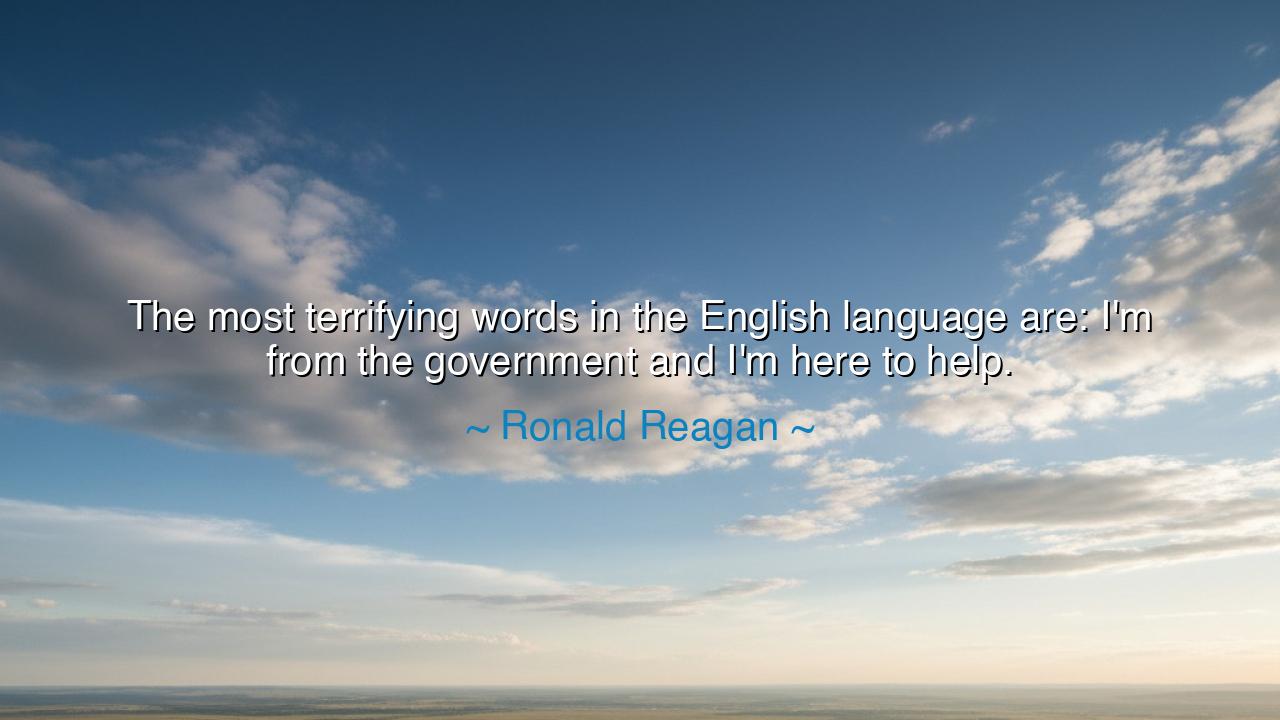
The most terrifying words in the English language are: I'm from
The most terrifying words in the English language are: I'm from the government and I'm here to help.






When Ronald Reagan declared, “The most terrifying words in the English language are: I'm from the government and I'm here to help,” he was not uttering a jest — though it was spoken with his signature humor — but delivering a profound warning born from the lessons of history and the heart of liberty itself. Beneath the wit lies a truth as sharp as a blade: power, even when cloaked in kindness, can devour freedom. Reagan understood that governments, like all human institutions, are tempted to overreach — to trade the vigor of the individual for the comfort of control. His words stand as a shield for future generations, reminding them that the road to servitude is often paved with promises of safety and aid.
The origin of this quote comes from Reagan’s years as both a student of history and a servant of the people. Having lived through the Great Depression, World War II, and the Cold War, he saw firsthand how the hand of government, when extended too far, could stifle the very spirit it sought to sustain. During his presidency in the 1980s, he often warned against the creeping expansion of bureaucratic power and the belief that the state could be the solution to all human ills. To Reagan, government was a necessary servant — but a dangerous master. His quip, often repeated in speeches, was a distillation of his philosophy: that freedom is not strengthened by dependency, but weakened by it.
At its heart, Reagan’s quote is a defense of individual responsibility and the sacred energy of the free citizen. It does not deny that governments have a role in justice, defense, and welfare — but it rejects the illusion that central authority can replace the will and wisdom of the people. For when a government grows powerful enough to give everything, it also grows powerful enough to take everything. The paternal state, though it may speak the language of compassion, often demands obedience in exchange for aid. Thus, Reagan’s words echo the ancient truth known to the philosophers of Greece and Rome alike: that liberty with risk is nobler than servitude with comfort.
History itself bears grim testimony to his warning. In the 20th century, nations across the world embraced governments that promised salvation — protection from poverty, war, and fear. Yet many of these promises became chains. The Soviet Union, for example, claimed to be the ultimate helper — the voice of equality and security for the people. But in its zeal to “help,” it stripped its citizens of voice, choice, and dignity. It replaced the marketplace of ideas with the machinery of control. What began with benevolent slogans ended with secret prisons and famine. Reagan, who faced the Soviet empire during his presidency, had seen how good intentions in the hands of unrestrained power could become instruments of tyranny.
Even in free societies, the same danger lurks quietly. Each time citizens surrender responsibility — asking the government to fix, to fund, to decide — they trade a small portion of their sovereignty. Over time, those small trades accumulate into servitude. The people begin to see themselves not as creators of their destiny, but as clients of the state. Bureaucracy multiplies, liberty erodes, and dependence takes root. Reagan’s words are not an attack on governance, but on forgetfulness — the forgetting that governments derive their power from the consent of the governed, and that the strength of a nation flows from its people, not its politicians.
And yet, his message is not merely cautionary; it is also inspirational. Reagan believed in the greatness of ordinary men and women — in their courage, ingenuity, and moral strength. He called upon citizens to see themselves not as subjects to be rescued, but as participants in the grand experiment of freedom. His humor concealed a challenge: Do not wait for others to save you; build, create, and stand firm in your own power. The helping hand of government should never replace the outstretched hand of the neighbor, the family, or the community. True help, Reagan believed, flows from the heart of a free people, not from the decree of a distant capital.
The lesson is eternal: freedom demands vigilance, humility, and self-reliance. A people too eager to be helped will soon be ruled. Therefore, cherish your independence, but temper it with virtue. Let governments serve their rightful role — to protect rights, enforce laws, and preserve peace — but no more. Every law passed, every program created, should be measured against the sacred question: Does this strengthen liberty, or diminish it? For in that balance lies the fate of every republic.
So let Reagan’s words echo like a warning bell to every generation: beware the comfort that comes with control. A government that reaches too far, even in kindness, can extinguish the fire of self-determination. Guard that fire as one guards the soul. Tend it with courage, with work, and with love for your fellow man. For the true helper of the people is not the distant official who claims to know what is best — it is the free citizen who acts with wisdom, compassion, and strength. Only then can liberty endure, and only then will the government truly serve its rightful master — the people themselves.






AAdministratorAdministrator
Welcome, honored guests. Please leave a comment, we will respond soon